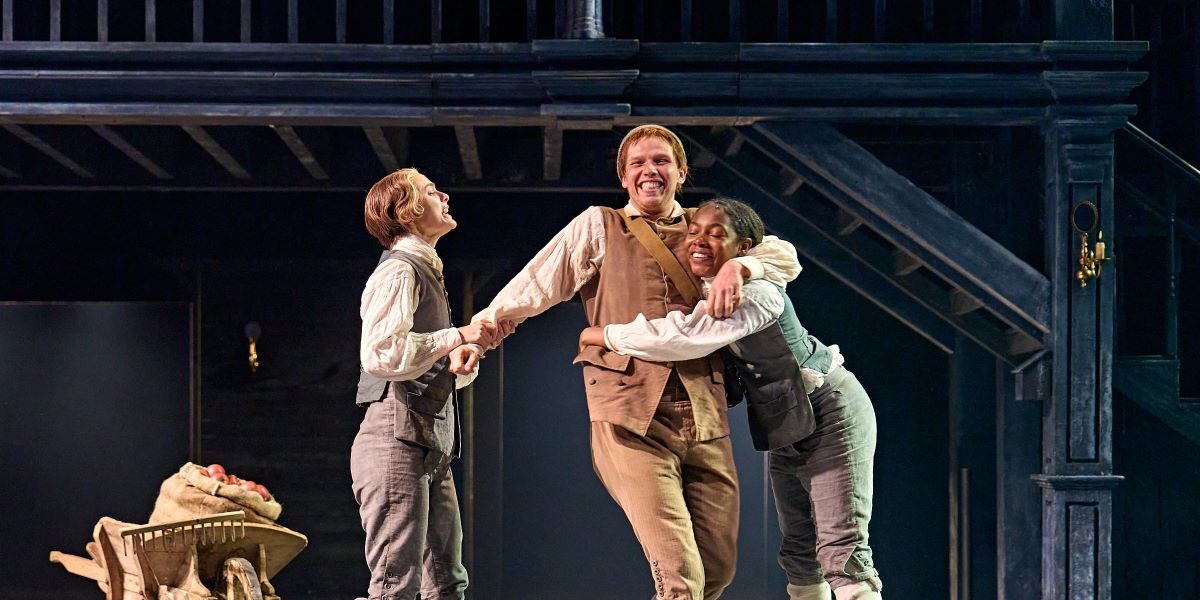‘Coram Boy’ was first performed at the National Theatre in 2005 and was one of the highlights of Nicholas Hytner’s tenure. This revival at Chichester is a valuable opportunity to look again at this slice through the seamier side of Georgian England. The play comes through strongly once more, repaying all the effort and cost of this lavish production.
One of the great strengths of the show is that it approaches familiar subjects from an unfamiliar angle. Yes, this is Georgian England, but it is certainly not the Georgian England of Jane Austen or Bridgerton. We have instead an inclusive social history that gives us a clear sense of how the power structures of that society were held together, and what lay behind the external glamour. Yes, we do get to meet George Frideric Handel, and encounter the famous Coram Hospital for foundling children where he was a trustee, but through the experiences of a fictional family and obliquely, not as undigested historical research.
The production works on many levels, but above all it is a rollicking adventure story alternating between London and a country estate in Gloucestershire. In the first half we meet a talented young musician, Alexander Ashbrook, torn between his inherited role as heir to a country estate, and his desire for a career in music, currently focused on Gloucester Cathedral where he sings alongside his good friend. Thomas Ledbury. Eventually he chooses music and his father disinherits him, but not before he has unknowingly fathered a child out of wedlock with Melissa Milcote, the daughter of the family governess. At this point the action fuses with the second main strand of the plot, surrounding Otis Gardiner, the ‘Coram Man’, who trades in unwanted children. Together with his accomplice, Mrs Lynch, the Ashbrooks’ housekeeper, he takes money from desperate women anxious to place their children in the safe location of the Coram Hospital. But instead the children are either sold or buried, dead or alive.
The second half of the evening follows the miraculous survival of one child through the intervention of Meshak, Gardiner’s epileptic son, who ensures the baby does reach Coram’s Hospital. Eventually after many suspenseful twists and turns the reunification of that child, Aaron, with his family ties all the many other strands of the plot back together and the balance of order is restored, though not without some significant commentary on how almost everyone in the social structures of the day is to a degree involved in acts of exploitation.
This is a large cast and the abiding memory is of a teeming murmuration of ensemble rather than leading roles. What is remarkable is how seamless it all is, given all the scene changes, music cues and time shifts. But a few performances do require particular notice. Louisa Binder has a supple energy and fizz as the young Alexander that drives the first half forward; she then returns to do the same as young Aaron. Jewelle Hutchinson likewise offers two remarkably constrasted roles, and is particularly effective as Toby Gaddam, Aaron’s much exploited friend. Pandora Clifford presides effortlessly over the aristocratic household as Lady Ashbrook; and a malign balance is provided by Jo McInnes, as Mrs Lynch, who contributes a particularly powerful and significant speech towards the end. For the show to work you need a really credible villain and Samuel Oatley delivers a portrayal of Otis in different guises that has both crude thuggery and specific menace. Aled Gomer completes the first tier roles with a highly empathetic and detailed portrayal of the well-intentioned Meshak.
An elaborate set on two levels allows for a slick switch between locations. The real-life musicians are placed on the balcony coordinated by Stephen Higgins, and the choir also uses this upper tier to good effect at points in the action. Sliding floors allow us to move from the gracious interiors of houses back to a grisly underlay of infant burials. There is a good deal of music, much of it choral, all excellently performed, with a lot of it by Handel, who also appears briefly as a benign ‘deus ex machina’.
‘Coram Boy’ has received quite a lot of criticism for the over-elaboration and improbability of its plot. This seems unfair – we accept a rollercoaster of unlikely outcomes from such writers as Dickens and Armistead Maupin, and so why not here too? Just because we are close to historical fact does not mean that spiritual and human truths cannot be dramatised on a broad canvas. On its own terms the show succeeds very well, and one has to think that Handel and Hogarth, the presiding geniuses at the Coram Hospital, would have approved.
Helen Edmundson (based on novel by Jamila Gavin)
Director: Anna Ledwich
Cast includes: Will Antenbring, Louisa Binder, Pandora Clifford, Rhianna Dorris, Aled Gomer, Harry Gostelow, Rebecca Hayes, Jewelle Hutchinson, Jo McInnes, Samuel Oatley, James Staddon
Photo Credit: Manuel Harlan
Until: 15 June 2024
3 hrs with interval

